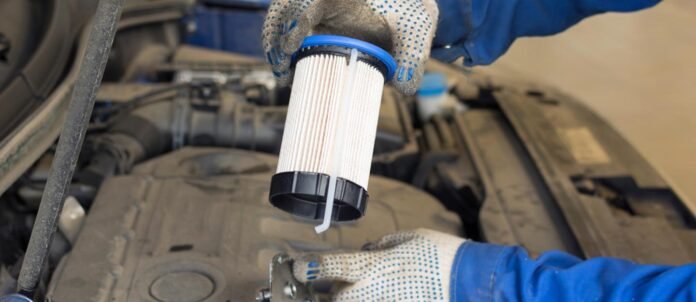The fuel filter is an often overlooked but crucial component of your car’s engine. Its primary job is to prevent dust and dirt particles from entering the engine’s combustion chamber. When the fuel filter gets clogged, it can lead to various problems that impact your vehicle’s performance and longevity. Understanding the common symptoms of a bad fuel filter can help you know when it’s time for a repair or replacement.
Signs You Need a Fuel Filter Change
A clogged fuel filter will not deliver enough fuel to the fuel pump and engine, leading to numerous issues. A car has different types of filters, including oil, fuel, cabin, and air filters. All these filters prevent dirt particles from entering critical components and causing engine problems. Maintaining these filters, especially the fuel filter, is vital for optimal vehicle performance.

Reduced Engine Power and Engine Misfire
When your vehicle climbs a hill or carries heavy loads, it requires extra power. A clogged fuel filter restricts the proper fuel flow to the engine, resulting in poor power response and engine misfiring. This symptom is often noticeable when your car struggles to accelerate or maintain speed under load.
Engine Stalling
If your vehicle starts and drives normally but stalls as you accelerate, a clogged fuel filter could be the culprit. As you accelerate, more fuel must be sent to the engine through the filter. If the filter is filled with dirt and debris, the fuel flow is restricted, causing the engine to stall and the vehicle to lose speed.
Trouble Starting the Engine

There are many reasons why an engine might not start, including issues with the car’s self-starter, battery, or spark plug. However, a bad fuel filter can also cause starting problems. If the filter is completely blocked, fuel cannot pass through, preventing the engine from starting. Sometimes, the car may start for a second and then die.
Check Engine Light Illuminating
A check engine light can indicate various issues, including a bad fuel filter. Although there is no specific code for a bad fuel filter, codes P0171 and P0174 can signal problems related to it.
- P0171: Indicates the car is running on a lean fuel mixture.
- P0174: Indicates a problem with the air-fuel mixture sensor.
Both codes can be triggered by a clogged fuel filter that does not allow sufficient fuel to pass through, disrupting the air-fuel mixture and ratio.
Low-Speed Vibration
If your car runs smoothly at cruising speed but vibrates at idle or slow speeds, this could be a sign of a bad fuel filter. Insufficient fuel reaching the engine at lower speeds can cause noticeable vibrations.
Poor Fuel Economy
Contrary to what you might think, a bad fuel filter can lead to poor fuel economy. A clogged fuel filter can cause the fuel pump to work harder and send more fuel than necessary, leading to inefficient fuel consumption.
Unpleasant Sounds from the Fuel Pump
Hissing or other unpleasant sounds from the fuel pump can indicate a clogged fuel filter. These noises result from the fuel pump straining to push fuel through a blocked filter.
Recommended Maintenance Schedule
Auto experts recommend changing the fuel filter every 30,000 to 60,000 miles. Regular maintenance ensures the filter remains clean and functions properly, preventing many of the issues discussed above.
How to Check for a Bad Fuel Filter
If you suspect a bad fuel filter, you can perform a simple check. Locate the filter, usually along the fuel line, and inspect it for dirt and debris. If it appears clogged, it’s time for a replacement.
Professional Diagnosis
While DIY checks are useful, a professional diagnosis is often necessary for accurate assessment. Mechanics have specialized tools to measure fuel pressure and flow, ensuring a precise diagnosis.
Potential Damage from Ignoring Fuel Filter Issues

Ignoring fuel filter problems can cause significant damage to the engine and fuel pump. The engine may suffer from poor performance, and the fuel pump could fail prematurely due to the extra strain of pushing fuel through a clogged filter.
Preventative Measures
To avoid fuel filter problems, follow these tips:
- Regularly service your vehicle according to the manufacturer’s recommendations.
- Use high-quality fuel to reduce the risk of contaminants.
- Monitor your car for any of the symptoms discussed and address them promptly.
Conclusion
Bad fuel filter symptoms require attention and replacement for better engine performance. Fuel filter problems can cause significant damage to the fuel pump and other engine components. By recognizing the signs and maintaining a regular replacement schedule, you can ensure your car runs smoothly and efficiently.
FAQs
- How often should I change my fuel filter? Auto experts recommend changing the fuel filter every 30,000 to 60,000 miles.
- What are the signs of a clogged fuel filter? Common signs include reduced engine power, engine misfire, stalling, trouble starting, check engine light, low-speed vibration, and poor fuel economy.
- Can a bad fuel filter cause engine damage? Yes, a clogged fuel filter can cause significant damage to the engine and fuel pump if left unaddressed.
- Is it possible to clean a fuel filter instead of replacing it? Some fuel filters can be cleaned, but most are designed to be replaced. Consult your vehicle’s manual for specific recommendations.
- What happens if I ignore fuel filter issues? Ignoring fuel filter problems can lead to poor engine performance, fuel pump failure, and increased repair costs.


